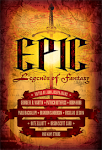This Halloween representation is of yet another type of horror, one that is of a personal nature: a family matter.
Shadow of A Doubt, released in 1943, is considered Alfred Hitchcock's best film and was his favourite. Hitchcock's use of overlapping characters, dialogue, and closeups provided a generation of film theorists with psychoanalytic potential.
A bored young woman, living in Santa Rosa, California, Charlotte "Charlie" Newton (Teresa Wright), is frustrated because nothing seems to be happening in her life and that of her family. Then, she receives wonderful news: her uncle (for whom she was named), Charlie Oakley (Joseph Cotten), her mother's brother, is arriving for a visit.
Two men show up pretending to be photographers and journalists working on a national survey of the average American family. One of them speaks to Charlie privately, identifying himself as Detective Jack Graham (Macdonald Carey) and telling her that her uncle is one of two men who are suspected of being a serial killer known as the "Merry Widow Murderer". This murderer has a modus operandi of seducing, murdering and robbing wealthy widows.
Young Charlie at first refuses to even consider that her uncle could be this person, but she cannot help noticing him acting strangely on several occasions, one being taking the front page of the newspaper, hiding it and then cutting out the article.
These two video excerpts reveal the escalating tension between niece and uncle. A scene with Herbie Hawkins (Hume Cronyn), a neighbour who appears periodically to discuss ideas for the perfect murder with Charlie's father, Joseph Newton (Henry Travers), sets Young Charlie off.
Young Charlie's growing suspicion soon becomes apparent to her uncle. He confronts her and admits that he is indeed the man the police are after. He begs her for help; she reluctantly agrees not to say anything, as long as he leaves soon, to avoid a horrible scandal in the town that would destroy her family, especially her mother, an emotionally fragile woman, who dearly loves and idolizes her younger brother.
Then news breaks that the second suspect was killed fleeing from the police, and is assumed to have been the guilty one. The detective Graham leaves. Uncle Charlie is satisfied at first, until he remembers that Young Charlie fully knows his secret. Soon, the young woman has a couple of near fatal accidents, falling down some very steep stairs, and being trapped in a closed garage with a car spewing exhaust fumes.
I am not providing the ending so as to avoid a spoiler. There are other interesting scenes in this movie not covered in this brief expose.
Research: wikipedia
Monday, 27 October 2008
Subscribe to:
Post Comments (Atom)














11 comments:
Ah, one of my favorite Hitchcock movies. I find I can't resist watching it every time it's on TV. :)
Michele, it's a favourite of mine, too.
old man hitchcock at his finest....
I've never seen this one. I enjoyed the scenes so I'll have to watch for it.
Tony, all of the Alfred Hitchcock movies were great.
Shelley, I liked how all the characters overlapped one another while adding depth to the story. Young Charlie's sister Ann was an interesting character with her intellectual foresight.
I've never seen this. Sounds interesting!
Good movie...
You know, I don't see this offered much on TV. I'd like to see it. May have to rent it.
I particulary like this film.
The trouble caused by mistruit and simultaneous attraction that this young woman to her uncle is rendered with such accuracy...
The interpretation of the theme of "the merry widow is excellent and perfectly the mood of the film.
I do believe I'm off to rent this one!
Lana, Charles, Steve: it is so well put together, little clues added one by one almost like teasers culminating to the end.
Webradio, I agree.
Post a Comment